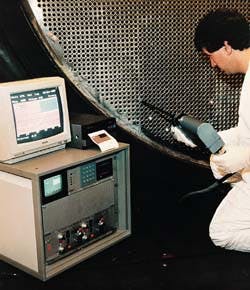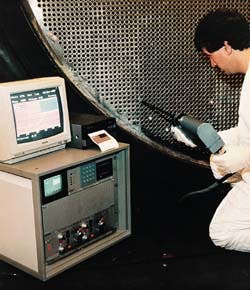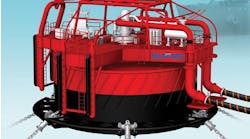PROCESS PLANT INSPECTION Project teams reviewing vessel, heat exchanger study methods
David Irving
Babcock Energy
Heat exchanger tubing inspection - eddy current profilometry.
Group-sponsored projects are a cost-effective way for the offshore industry of funding work tackling inspection problems affecting a number of companies. "Periodic Inspection of Vessels from the Outside only", currently under way at Babcock Energy Technology Centre in Renfrew, Scotland, has nine sponsors, eight oil company operators and the UK's Health & Safety Executive.
There would be major advantages to operators of pressure and process vessels requiring periodic in-service inspection if these inspections could be performed from the outside only. This is because opening up the vessels to allow man access inside generally increases the overall cost associated with the inspection and the vessel outage time.
Also, the environment within the vessel may be hazardous due to the confined space and potentially harmful vapors, and the disruption caused by opening up the vessel can lead to problems, such as leaks, when the process is re-started.
The aims of this project are:
- to identify, optimize and quantify the capabilities of appropriate non-invasive ultrasonic inspection techniques.
- to review the capabilities and limitations of complementary (non-ultrasonic) inspection methods.
- to establish a methodology for devising non-invasive inspection strategies.
- to provide guidelines for designers on how to optimize vessel design to facilitate non-invasive inspections.
A large range of testpieces simulating relevant component geometries and containing real and simulated defects are being manufactured to optimize inspection techniques: they also constitute a testpiece library from which sponsors can borrow specimens to validate inspection organizations.
Another Babcock project, Evaluation of Inspection Techniques for Heat Exchanger Tubing, currently has five sponsors. It covers the objective and systematic assessment of the capabilities of a variety of techniques and equipment for in-service inspections of heat exchanger tubing.
Efficient operations and effective preventative maintenance require regular assessment of the condition of tubes within heat exchangers. However, the most appropriate inspection technique depends not only on defects of concern but also on tube material.
For example, conventional eddy current techniques are effective for non-magnetic material (such as stainless steel), but alternative techniques are required for materials of intermediate (such as duplex) or high (e.g. carbon steel) magnetic permeability.
Work has involved trials covering a broad matrix of inspection equipment (ultrasonic, eddy current, advanced electromagnetic), tube material and defect type.
Main deliverable of the project is a report providing guidelines on the capabilities of the various inspection techniques investigated, and which is the most appropriate for a particular tube material/defect type. This will allow plant operators to optimize inspection strategies.
The modern trend for many pipework and pressure vessel applications offshore is to use duplex or super duplex materials: their high strength properties result in significant weight saving due to the thinner wall design.
However, as the pipework becomes more flexible, mechanical properties such as natural frequency change, and this has led to high cycle fatigue failures on several installations. These are induced by normal operation, for example on plant adjacent to reciprocating compressors, as opposed to the lower cycle fatigue arising from start up/shut down.
Babcock Energy Technology Centre has investigated this problem in the UK and Norwegian sectors under contract to operators, some of which have experience these failures. Use has been made of hand-held equipment that enables the test engineer to perform a survey of several hundred locations on the plant in one shift.
The result is large savings compared with conventional measurement techniques using fixed transducers. This experience has allowed Babcock to identify areas of concern quickly and provide recommendations for design modifications.
Currently the approach to fatigue analysis tends to follow the recommendation of BS5500 Inquiry Case 79. This requires the calculation or measurement of the cyclic stress range at the most highly stressed region, which in most cases is at a weld.*
The code only specifies generalized SN curves for all ferritic and austenitic material, but it is believed that the allowable stress ranges for duplex materials could be greater than those currently allowed in the code. Most areas where fatigue is defined as life limiting require modification to reduce the stress ranges for compliance with the code, and this may be resulting in unnecessary expenditure.
If accurate fatigue data could be made available for standard weld geometries, engineers would have more confidence in fatigue life predictions, and operators could also benefit through the need for modifications being alleviated. It is therefore proposed that Babcock carry out a range of fatigue tests on the most commonly found geometries to acquire the appropriate information.
Laboratory tests will be performed to simulate the dynamic stress patterns measured during platform surveys. This could lead to the development of industry-standard curves which accurately describe the fatigues properties of welded duplex components.
An ultimate aim of the project would be to submit the data for inclusion into European codes and standards as input to the EC Framework IV programme, which seeks to provide reliable measurement and testing throughout Europe.
Potential sponsors or organizations interested in this project should contact Babcock Energy on +44 141 886 2201.
Copyright 1995 Offshore. All Rights Reserved.




